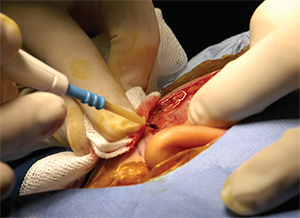Even though the evidence is now clear that cochlear implants (CIs) work, many patients who would benefit from them still do not have them, and challenges and questions remain about when to offer the devices and how to ensure patients are reimbursed for them. A panel of experts gathered at the Triological Society Combined Sections Meeting discussed available options for patients with unilateral and bilateral hearing loss.
Explore This Issue
March 2017Craig Buchman, MD, Lindburg Professor and chair of the department of otolaryngology-head and neck surgery at Washington University School of Medicine in St. Louis, said that approximately 40 million people in the U.S., and 350 million around the world, suffer from hearing loss. While 1.4 million people are CI candidates, he added, “We’re only looking at 100,000 cochlear implant recipients in the U.S. Less than 10% of people who are CI candidates are actually getting these devices. That’s sort of a sad story.”
He said the field is past the point of having to prove the merit of these devices. “We’re no longer in the business of proving that the cochlear implant works—our biggest chore going forward is learning how to deliver this to the people who need it.”
Panelists delved into some of the issues surrounding CIs as they discussed patient cases.

Cochlear implant surgery.
© AJPhoto / Science Source
Sudden Sensorineural Hearing Loss
The first case involved a 52-year-old man with sudden sensorineural hearing loss in his left ear that had begun 17 months before. He’d had difficulty hearing people in front of him when they were more than three or four feet away and had stopped going to restaurants because of trouble hearing in noisy settings. He’d had no history of noise exposure and his imaging was normal. He tried a contralateral routing of signal (CROS) hearing aid, but said it actually made hearing worse in noisy situations.
Brian McKinnon, MD, MBA, MPH, vice chair of otolaryngology-head and neck surgery at Drexel University in Philadelphia, said he would consider evaluating this patient for a central processing problem, given the severity of his hearing loss at a relatively young age. “He seems remarkably debilitated,” he said.
Other panelists said they would move straight to pursuing a CI, but said getting reimbursed is a huge challenge for single-sided hearing loss. “When we first embarked on this about 15 years ago, it went really well. Nobody asked any questions,” said J. Thomas Roland, MD, chair of otolaryngology–head and neck surgery at New York University Langone Medical Center. “But now it’s getting more difficult.” He said he usually has four or five patients at various levels of appeal, and one patient who is an attorney has sued his insurer over CI coverage.